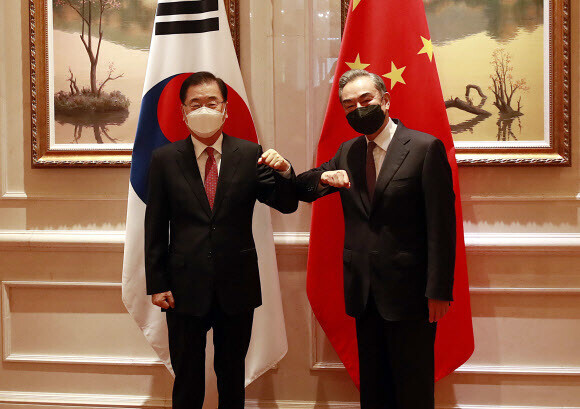hankyoreh
Links to other country sites 다른 나라 사이트 링크
S. Korea, China reaffirm commitment to denuclearization

South Korean Minister of Foreign Affairs Chung Eui-yong and his Chinese counterpart, State Councilor and Foreign Minister Wang Yi, agreed on the aims of achieving denuclearization of the Korean Peninsula and establishing permanent peace.
They also agreed to hold a joint foreign affairs and national security dialogue (two-plus-two) between the South Korean and Chinese foreign and defense ministries for the first time in six years.
In addition to reaffirming the strategic aims of achieving denuclearization and peace on the peninsula during their meeting, the South Korean and Chinese foreign ministers also agreed to increase senior-level strategic dialogue at the bilateral level.
Aside from its content, the foreign ministers' Saturday meeting's timing and venue drew some attention. Specifically, the two of them met in Xiamen — a city in China's Fujian Province just across the strait from Taiwan — shortly after the South Korean, US and Japanese national security advisers had affirmed their commitment to trilateral cooperation in a dialogue at the US Naval Academy near Washington.
At a time when the US and China have been looking to strengthen cooperation with allies and friends in the wake of their public clash in a strategic dialogue in Alaska last month, Seoul's "balanced diplomacy" approach is being put to the test, with its foreign affairs and national security leaders participating in key talks with both Washington and Beijing.
While the latest meeting did not include the kind of blunt rhetoric seen at the South Korea-US foreign ministers' meeting last month, some aspects of it suggested cause for reflecting on South Korea's diplomacy amid the current competition and mutual curbs between the US and China.
In introductory remarks before the meeting, Wang described China and South Korea as "important countries in the region and partners in strategic cooperation."
"They hold the same or similar positions of matters such as guarding regional peace and safety, pursuing joint development and supplementing global governance," he added.
Senior officials with the South Korean Ministry of Foreign Affairs (MOFA) reported that Wang related his position on US-China relations "very candidly" during the meeting.
In terms of the Korean Peninsula situation, MOFA said the two ministers had "agreed that they share the same objectives in achieving denuclearization of the Korean Peninsula and establishing permanent peace."
"They agreed to continue expanding cooperation to manage the Korean Peninsula situation on a stable footing and lay the groundwork for advancements with the Korean Peninsula peace process," it added.
Ahead of the meeting, Wang stressed Beijing's basic position in favor of "pursuing a process of political resolution of Korean Peninsula issues together with South Korea through a dialogue-based approach." The two sides reportedly exchanged concrete, in-depth opinions during the meeting on ways of achieving practical progress with the Korean Peninsula peace process.
A notable development in bilateral relations was the two sides' agreement to pursue a strategic dialogue between their vice foreign ministers and a "two-plus-two" foreign affairs/national security dialogue within the first half of 2021.
South Korea and China had their first two-plus-two dialogue in December 2013, with senior representatives at the bureau director level on each side. A second meeting was held in January 2015, but none has taken place since then.
The latest announcement means that they will be holding their first such dialogue in six years, with senior representatives at the higher vice minister level. While the possibility was previously discussed during a South Korea visit by Wang last November, this is the first time the two sides have made it official.
Since last year, the two sides have also been pursuing a possible South Korea visit by Chinese President Xi Jinping. During the meeting, they reaffirmed that such a visit would be pursued as early as possible once the COVID-19 situation has stabilized.
Chung hinted at some progress on this front, stating that the two sides had "agreed to begin discussions on concrete plans," while China did not share any comment publicly.
By Kim Ji-eun, staff reporter
Please direct comments or questions to [english@hani.co.kr]

Editorial・opinion
![[Column] Welcome to the president’s pity party [Column] Welcome to the president’s pity party](https://flexible.img.hani.co.kr/flexible/normal/500/300/imgdb/original/2024/0515/3917157400447943.jpg) [Column] Welcome to the president’s pity party
[Column] Welcome to the president’s pity party![[Editorial] Korea must respond firmly to Japan’s attempt to usurp Line [Editorial] Korea must respond firmly to Japan’s attempt to usurp Line](https://flexible.img.hani.co.kr/flexible/normal/500/300/imgdb/original/2024/0514/2317156736305813.jpg) [Editorial] Korea must respond firmly to Japan’s attempt to usurp Line
[Editorial] Korea must respond firmly to Japan’s attempt to usurp Line- [Editorial] Transfers of prosecutors investigating Korea’s first lady send chilling message
- [Column] Will Seoul’s ties with Moscow really recover on their own?
- [Column] Samsung’s ‘lost decade’ and Lee Jae-yong’s mismatched chopsticks
- [Correspondent’s column] The real reason the US is worried about Chinese ‘overcapacity’
- [Editorial] Yoon’s gesture at communication only highlights his reluctance to change
- [Editorial] Perilous stakes of Trump’s rhetoric around US troop pullout from Korea
- [Guest essay] Preventing Korean Peninsula from becoming front line of new cold war
- [Column] The state is back — but is it in business?
Most viewed articles
- 1[Column] Welcome to the president’s pity party
- 2Could Korea’s Naver lose control of Line to Japan?
- 3[Editorial] Korea must respond firmly to Japan’s attempt to usurp Line
- 4[Editorial] Transfers of prosecutors investigating Korea’s first lady send chilling message
- 5[Column] Will Seoul’s ties with Moscow really recover on their own?
- 6Major personnel shuffle reassigns prosecutors leading investigations into Korea’s first lady
- 7Naver’s union calls for action from government over possible Japanese buyout of Line
- 8US has always pulled troops from Korea unilaterally — is Yoon prepared for it to happen again?
- 9[Photo] Korean students protest US complicity in Israel’s war outside US Embassy
- 10Second suspect nabbed for gruesome murder of Korean in Thailand, 1 remains at large